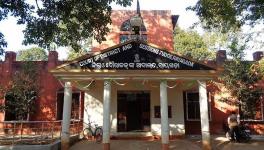Elite Schools in Chennai: Patriarchy in Caste-Homogenous Spaces

Image Courtesy: DTNext
On 24 May, social media platforms were suddenly abuzz with allegations of sexual misconduct by a senior male teacher, G Rajagopalan, in one of the most prestigious and elite-dominated schools in Chennai, the Padma Seshadri Bala Bhavan (PSBB). Soon, current students and alumni started sharing stories of how this teacher would ask female students to come out for movies, send pornographic links via texts and even sat half-naked during online classes during the pandemic. Ironically, he was a member of the school’s Sexual Harassment Committee. The PSBB issued a statement that they had received no complaints but later changed it to say that it got no written complaints. This was after tens of students and parents came out saying there have been allegations against this teacher for years, but the management chose to turn a blind eye to them.
Upon a written complaint by a group of girls, the police arrested the accused. Subsequently, the school suspended the accused. The PSBB and its trustees gave a media statement that was in the tone of trying to protect their legacy rather than hold themselves accountable. Renowned singer and activist TM Krishna condemned the letter for its omission of phrases such as sexual abuse and sexual harassment, which would have been a first step to acknowledge what the students have experienced.
However, sexual harassment and predation are not all the school seeks to paper over. The event also illuminates the subtle nuances and intricacies on which the elite private schools in Chennai are built. Schools such as PSBB are overwhelmingly Brahmanical. As also, Brahmin/upper caste teachers and students are numerically dominant in them. Being Brahmin is not the problem, being Brahmanical is. Such institutions stand on edifices of Brahmin/upper caste endogamy, and at the very least, they reinforce and sustain Brahminical, puritanical values and foreground caste pride, as TM Krishna observed in an interview.
Take for example Madhuvanthi, a member of the Tamil Nadu State Executive Committee of the Bharatiya Janata Party (BJP), who is also the daughter of YG Mahendra, a trustee of the school. Madhuvanthi has contended that the law should punish the accused. However, she contradicted herself by recasting the state action against the accused as an anti-Hindu and anti-Brahmin act. This should answer the question—why bring caste into this case? The bravery of the girls who have lodged a police complaint is commendable, but Madhuvanthi and others like her seek to squander away their gains so far. Put another way, the police acted upon a complaint filed by the victims many of whom are probably upper caste/Brahmin. The accused has been associated with the school for around two decades. So, how does the due process of law suddenly become anti-Hindu or anti-Brahmin? Is not such a remark insensitive vis-à-vis the courageous action of the children and their families? Besides, Madhuvanthi is not alone in peddling such a narrative. Rajya Sabha Member of Parliament Subramanian Swamy has dubbed the questioning of the impunity as Brahmin-bashing and equated it to, of all things, anti-Semitism.
The centuries-old phenomenon of Brahmanical patriarchy is certainly at play here. By Brahmanical, we mean a mindset that fosters and reposes in itself the essence of the caste system and legitimises revering a few social groups and imparting indignity to all others. In simple terms, Brahmanical patriarchy is the intersection of caste pride and gender subjugation, and that is what we are seeing play out in the current episode.
Feminist historian Uma Chakravarti has called Brahmanical patriarchy “a set of rules and institutions in which caste and gender are linked, each shaping the other and where women are crucial in maintaining the boundaries between castes”. In other words, the focal point of Brahmanical patriarchy is women’s sexuality. Brahmanical families fear the sexuality of males of non-elite castes, for they seek to prevent the “dreadful” intermixing of castes. This is why Brahmanical patriarchy places women under constant surveillance.
There is a further layer of complexity to this issue. Rajagopalan’s confession of his sexual predation, and acknowledgement that he was not the only predator, raises a paradox for those who believe that upper caste-homogenous spaces are safe for children, especially girls. Generations of elite caste/Brahmin parents have enrolled their children in schools such as these to ensure a safe—meaning, almost completely homogenous—environment for their wards. Further, soon after allegations surfaced against the PSBB teachers, many students from other elite-dominated schools also started sharing their traumatic experiences of sexual misconduct by teachers.
If there is shock and anger over the alleged crimes, there is also a sense of incredulity that an elite-caste teacher in a Brahmanical school could have violated the bodily integrity and autonomy of girl children of similar caste status. There is just as much incomprehension over how a Brahmanical school could have turned out to be unsafe for upper-caste students. We must remember: caste is a system of graded inequality. It is this system that has allowed the Brahmanical man to thrive in a realm of impunity for generations. The Brahmin-Brahmanical male draws his caste power from being considered ritually pure and non-polluting but it is the power of hierarchy embedded in caste that marks the entire Brahmin/upper caste with impunity. While the entire caste system is about dharma—doing what is expected from a person belonging to a given caste—a greater power is associated with being higher up the caste order. It is this that makes space for impunity, imparts legitimacy despite misdeeds.
One has to extend Chakravarti’s theory of brahminical patriarchy to the idea of pativrata (loyalty and devotion of a woman towards her husband) to comprehend the ambivalent and defensive responses of the PSBB to the allegations it is facing. In its eyes, the crime of sexual abuse and harassment seems heinous not because it violates the bodily integrity of a girl child but because it could affect her reputation, marriage prospects and the Brahmanical family’s honour. It is why it has sought to paper over the allegations, and it is also why the caste factor cannot be ignored in this case. The preoccupation with honour is not an enduring characteristic of Brahmin families alone but it is a sharp indicator of how Brahmanical patriarchy functions and near-homogeneous schools like PSBB reinforce it.
Michel Foucault, the French philosopher, said, “Power is not only the one which works vis-à-vis repression or inhibition, or male domination, but as the one which works through institutionalised discourses which include action, knowledge and being.” In this context, the institutionalised discourse is patriarchy in particular, and equally important is its relation to caste dynamics.
On the one hand, we are seeing a clamour to protect school-going children from sexual predation. For instance, there are calls to amend the Protection of Children from Sexual Offences (POSCO) Act to extend its protection to children who were sexually abused before the law was enacted in 2012. However, very few want to address the sustained caste homogeneity of elite private schools, which is a result of and perpetuates Brahmanical patriarchy. The caste perspective is not a means to trivialise or take the attention away from the trauma of sexual harassment. Nor is it intended as a means to deploy women’s bodies on the battlefield against yet another institutionalised power. It is a method to highlight the intersection of caste and gender and demonstrate the primacy of Brahmanical patriarchy in elite spaces. The decision of girls across schools in Chennai to pursue their tormentors and abusers is an inflexion point. It marks a shift away from challenging caste at the periphery to reaching the core that sustains it—its subjugation of the female gender.
Vishal Vasanthakumar is a graduate of the Harvard Graduate School of Education and an independent researcher working at the intersection of caste, politics and education. Yazhini P.M. is a doctor based in Chennai. Vignesh Karthik KR is a doctoral researcher at the King’s India Institute, King’s College London. The views are personal.
Get the latest reports & analysis with people's perspective on Protests, movements & deep analytical videos, discussions of the current affairs in your Telegram app. Subscribe to NewsClick's Telegram channel & get Real-Time updates on stories, as they get published on our website.
























